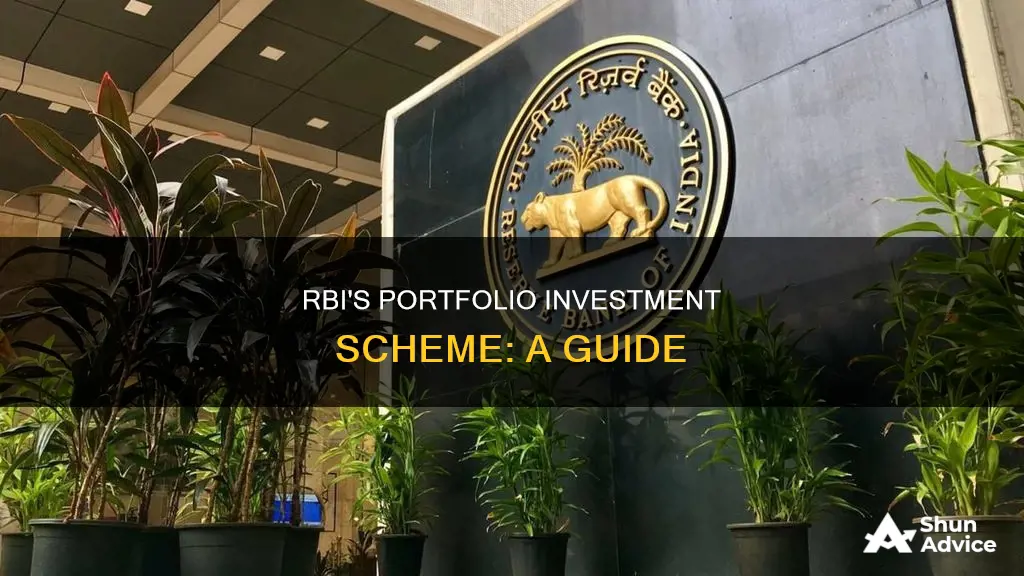
The Portfolio Investment Scheme (PIS) is a scheme by the Reserve Bank of India (RBI) that enables Non-Resident Indians (NRIs) to invest in the Indian stock market. Through the PIS, NRIs can purchase and sell shares, debentures, and bonds of Indian companies on a recognised stock exchange. The scheme allows NRIs to invest on a repatriation or non-repatriation basis, with transactions routed through their NRI Savings Account with a designated bank branch. The PIS is designed to regulate the total investment limit of NRIs and facilitate smooth transactions.
What You'll Learn
- The RBI's Portfolio Investment Scheme (PIS) allows NRIs to invest in stocks and mutual funds through stock exchanges in India
- NRIs can invest on a repatriation or non-repatriation basis
- To invest on a repatriation basis, an NRI needs a PIS-enabled NRE account
- For investment on a non-repatriation basis, an NRO account is required
- The RBI monitors the investment position of NRIs and FIIs in listed Indian companies

The RBI's Portfolio Investment Scheme (PIS) allows NRIs to invest in stocks and mutual funds through stock exchanges in India
The Portfolio Investment Scheme (PIS) is a scheme by the Reserve Bank of India (RBI) that allows Non-Resident Indians (NRIs) to invest in the Indian stock market. NRIs can use the PIS to buy and sell shares, debentures, and bonds issued by Public Sector Undertakings (PSUs) in the Indian stock market. They can also apply for Initial Public Offerings (IPOs) through the PIS.
To use the PIS, NRIs must open a designated PIS account with a bank authorised by the RBI to conduct business under the scheme. This account is separate from their regular NRI bank account and can be either an NRE (Non-Resident External) account or an NRO (Non-Resident Ordinary) account, depending on whether the investment is on a repatriation or non-repatriation basis. The NRE account is for investments made with money from outside India that can be easily repatriated, while the NRO account is for investments made on a non-repatriation basis.
Once the PIS account is set up and connected to the NRE/NRO savings accounts, NRIs can buy and sell shares, debentures, and bonds. Payment for purchases can be made through inward remittance of foreign exchange/funds into the NRE account for repatriation basis purchases or through the NRO account for non-repatriation basis purchases. On the sale of investments, the amount can be credited to the NRE/NRO accounts if the sale is on a repatriable basis. If the sale is on a non-repatriation basis, the sale proceeds can only be credited to the NRO account.
It is important to note that NRIs cannot have multiple PIS accounts and can only operate through one designated bank for their PIS transactions. Additionally, the PIS cannot be used for day trading or short selling, and there are certain restrictions on the percentage of paid-up capital/paid-up value that NRIs can invest in both repatriation and non-repatriation stocks.
The PIS is a useful scheme for NRIs who want to invest in the Indian stock market and take advantage of its benefits, such as the ability to freely buy and sell stocks and repatriate funds.
Investment Bankers: Crafting Portfolios, Analyzing Fundamentals
You may want to see also

NRIs can invest on a repatriation or non-repatriation basis
For NRIs to invest in Indian equity on a repatriation basis, they must route their investments through a PIS-enabled NRE bank account. This means that their demat and trading accounts must be linked to their PIS-enabled NRE account. These transactions are reported to the RBI.
On the other hand, NRIs can invest on a non-repatriation basis through their Non-Resident Ordinary (NRO) account. Their income sourced in India, such as rent, dividends, or pension, can be used for non-repatriable investments. While there are some restrictions on transferring proceeds from non-repatriable investments outside India, NRIs do not need RBI permission to invest in Indian equity on a non-repatriation basis. They simply need to link their demat and trading accounts to their NRO account.
NRIs can invest in the following financial instruments on a non-repatriation basis:
- Domestic and money market mutual funds
- Government dated securities
- Bonds issued by PSUs in India
- Bonds issued by infrastructure debt funds
- Listed non-convertible debentures
- Perpetual debt instruments and debt capital instruments issued by banks in India
- Initial Public Offerings (IPOs)
- National Pension System (NPS)
- Exchange-traded derivative contracts approved by SEBI
- Government securities (G-Secs)
Understanding Aaron's Portfolio: Equal Investment, Beta Calculation
You may want to see also

To invest on a repatriation basis, an NRI needs a PIS-enabled NRE account
The Portfolio Investment Scheme (PIS) is a scheme introduced by the Reserve Bank of India (RBI) to enable Non-Resident Indians (NRIs) to invest in the stocks of Indian companies. The PIS allows for both repatriation and non-repatriation of profits.
For NRIs, investing on a repatriation basis requires a Non-Resident External (NRE) account. This is a primary account for NRIs in India, ideal for those with income sources or investments in the country. An NRE account allows NRIs to deposit foreign currency earnings and save them in Indian currency. It also allows for the full repatriation of Indian funds to the investor's country of residence.
To invest in stocks on a repatriation basis, NRIs must link their demat and trading accounts to their PIS-enabled NRE account. This is a necessary step to facilitate the repatriation of profits and funds back to the investor's home country. The process of opening a PIS account can be complex and time-consuming, requiring permission from both a bank and the RBI.
In addition to stock trading, NRIs can invest in various financial instruments on a repatriation basis through their PIS-enabled NRE account. These include:
- Domestic mutual funds
- Government dated securities
- Bonds issued by Public Sector Undertakings (PSUs) in India
- Bonds issued by infrastructure debt funds
- Listed non-convertible debentures
- Perpetual debt instruments and debt capital instruments issued by banks in India
- Initial Public Offerings (IPOs)
- National Pension System (NPS)
It is important to note that there are regulatory frameworks and limitations for repatriation investments. For example, NRIs can invest only up to 5% of the total paid-up capital of a company for investments under repatriation. Additionally, there may be restrictions on the maximum foreign or NRI shareholding allowed in a company.
Land Investment: A Guide to Expanding Your Portfolio
You may want to see also

For investment on a non-repatriation basis, an NRO account is required
The Portfolio Investment Scheme (PIS) is a scheme of the Reserve Bank of India (RBI) that enables Non-Resident Indians (NRIs) and Overseas Citizens of India (OCBs) to purchase and sell shares and debentures of Indian companies on a recognised stock exchange. Transactions can be routed through an NRI Savings Account with a designated bank branch.
NRIs can choose to invest under repatriation or non-repatriation basis. For any transaction in the secondary market on a non-repatriation basis, an NRO (Non-Resident Ordinary) account is required. An NRO account is ideal for NRIs who have income sources or investments in India, such as rent, loan EMI, and insurance payments. Any income earned in India can be deposited into an NRO savings account. NRIs can also use their NRO account to withdraw money in Indian currency when visiting India.
The investments made through the non-repatriation route cannot be transferred outside India. The funds in NRO accounts are usually from income earned locally, such as rent on a property acquired in India. There are tax liabilities associated with NRO accounts, and it is only possible to repatriate funds after deducting taxes.
To invest in the Indian stock market through the Portfolio Investment Scheme on a non-repatriation basis, NRIs need to open an NRO account and submit a PIS application form in the prescribed format to designate the savings account as a PIS account.
Equilibrium Economics: Savings-Investment Identity
You may want to see also

The RBI monitors the investment position of NRIs and FIIs in listed Indian companies
The Reserve Bank of India (RBI) closely monitors the investment position of Non-Resident Indians (NRIs) and Foreign Institutional Investors (FIIs) in listed Indian companies. The RBI receives daily reports from designated banks on the investment holdings of NRIs and FIIs, allowing it to track their investment levels in specific companies. When the combined holdings of NRIs and FIIs approach the sectoral cap, the RBI issues a caution list to designated bank branches, indicating that further purchases of shares in that company will require its prior approval. Once the investment limit is reached, the RBI places the company on a ban list, prohibiting NRIs from purchasing shares in that company under the Portfolio Investment Scheme (PIS). This monitoring process ensures that NRIs and FIIs comply with investment regulations and sectoral caps.
The PIS, established by the RBI, enables NRIs to purchase, sell, and invest in shares, debentures, and bonds of Indian companies on recognised stock exchanges. It provides a framework for NRIs to invest in the Indian stock market, allowing them to choose between repatriation and non-repatriation bases for their transactions. The PIS offers benefits such as the ability to invest in Indian stocks, freely buy and sell stocks, and user-friendly operations. However, it is important to note that NRIs cannot engage in intraday trading or short selling of shares under this scheme.
To utilise the PIS, NRIs must open a designated bank account specifically for this purpose, which can be either an NRE (Non-Resident External) or an NRO (Non-Resident Ordinary) account. The NRE account is used for investments made with funds repatriated from abroad, while the NRO account is for investments on a non-repatriation basis. Transactions under the PIS are routed through these designated accounts, ensuring compliance with RBI regulations.
The PIS plays a crucial role in facilitating NRIs' participation in the Indian stock market, providing a structured mechanism for their investments and ensuring adherence to regulatory requirements. The RBI's monitoring of NRIs' and FIIs' investment positions helps maintain the integrity of the market and prevents violations of investment limits.
Understanding Sustainable Yields for Long-Term Investment Success
You may want to see also
Frequently asked questions
The Portfolio Investment Scheme (PIS) is a scheme by the Reserve Bank of India (RBI) that allows Non-Resident Indians (NRIs) to buy and sell shares, debentures, and bonds issued by Public Sector Undertakings (PSUs) in the Indian stock market.
The PIS enables NRIs to invest in the Indian stock market and freely trade stocks, with the exception of intraday transactions. It also allows NRIs to repatriate their investments.
According to RBI guidelines, both NRIs and Persons of Indian Origin (PIOs) are eligible for the PIS. However, residents of Bangladesh and Pakistan require prior RBI permission, and residents of Nepal and Bhutan are not eligible.
The requirements for a PIS account typically include identity proof, overseas address proof, photographs of the investor, a PIS permission letter, an account opening form, and an approval letter from the designated bank. Some banks may also require a minimum balance.
No, the RBI allows NRIs to have only one PIS account. If an NRI wants to open a new PIS account, they must first close their existing one.







